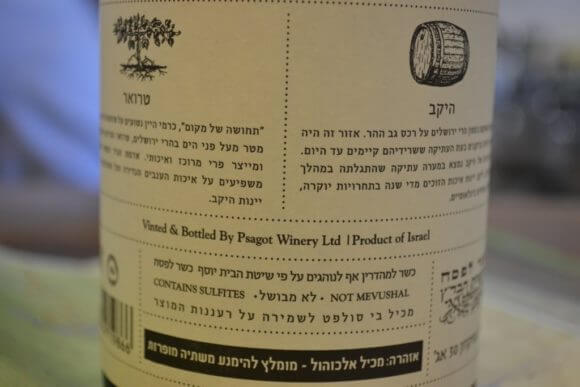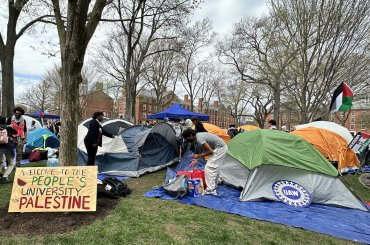Last Friday, just before winding down for the weekend, Canada’s attorney general announced he was appealing a recent federal court ruling that banned labeling wines made in West Banks settlements as products of Israel.
The announcement was not unexpected, especially as Canada is gearing up for the federal elections on October 21. However, it put the Canadian government squarely in the limelight as openly violating the Fourth Geneva Convention, and as the Jerusalem Post announced: “David Lametti, Canada’s attorney-general, has taken a stand in favor of labeling West Bank wines ‘Products of Israel’.” Not that multiple Canadian governments haven’t repeatedly flaunted international law (and even official Canadian policy) when it comes to Palestinian rights, but Liberal governments in particular usually prefer to do it in a less flashy and more duplicitous manner.
All of the major Zionist lobby groups in Canada, as well as the Israeli foreign ministry, had weighed in on the necessity of appealing the ruling that had determined that putting the “Product of Israel” label on illegal settlement wines was “false, misleading and deceptive”. The foreign ministry claimed the court ruling emboldened the BDS movement and added: “The Ministry of Foreign Affairs and the Israeli embassy in Canada will continue to act against discriminatory treatment and the singling out of Israel in the matter of product labeling in Canada.”
But the Canadian federal election looms on the horizon, and if the chances were slim that the government would not appeal under normal circumstances, they were now reduced further. Both the Liberal and Conservative Parties in Canada are eager to prove who is more capable of implementing the pro-Israel agenda; John Baird, Canada’s former foreign minister under Stephen Harper, already threw down the gauntlet at a campaign fund-raising dinner on August 29 in Montreal saying: “Israel needs friends on the tough days who stand behind her when she needs help.”
Independent Jewish Voices Canada had intervenor status in the original court case, and their national coordinator Corey Balsam noted in a press release on September 9, 2019: “Sadly, the appeal looks to be solely for political reasons–to appeal to certain voters and lobbyists–rather than to pose any legitimate challenges to the judge’s interpretation of Canadian law.”
Meanwhile, in a supreme act of petty revenge or sour grapes, the Canadian government last month held up a previously approved shipment of Taybeh wines and beer from Palestine, citing the court ruling and claiming further direction from the Canadian Food Inspection Agency was needed. However, in contrast to this, the wines from illegal Israeli settlements with the “Product of Israel” label were and are still on the shelves for sale. Those, it seemed, didn’t need to be “put on hold” requiring possible “corrective work.” As Karen Rodman with Palestine Just Trade, the Taybeh importers, stated: “LCBO (Liquor Control Board of Ontario) imported Taybeh beer and Nadim wine by Taybeh, approving it as “Product of Palestine.” To base their decision on a conflation with wines produced in settlements occupied illegally under international law is illogical.”
So, what’s the takeaway message from this whole affair to date? One is that we should have no illusions about the intentions of the Canadian government and the Liberal party regarding their support for Israel. Prime Minister Justin Trudeau’s words have been very clear over the years (although he does try to muddy the waters with his alleged commitment to multiculturalism). He hasn’t been shy to tell us repeatedly, “We have more than an ally in Israel, we have a trusted and longstanding friend,” or that the BDS call is anti-Semitic and that “Canadian values” dictate that it must be opposed, or “…we will continue to condemn BDS and any movement that attacks our Israeli friends, Jewish Canadians, and the values we share.”
The pro-Israel advocates were right on one thing – the way this labeling fiasco has played out will probably help the BDS movement, but not for the reasons they cited. Given this insistence on blurring any distinctions between settlement wines and products of Israel, consumers of conscience have been shown the only reasonable option is to boycott all Israeli wines (and products).
And lastly, as activists for Palestinian rights, we must not allow ourselves to be seduced by the fervour and illusory quick fix of electoral party politics. The more difficult grassroots work of developing principled campaigns and community allies is the only way to achieve any real change, and developments in Canada in the last six months have shown it can bring genuine results.



Canadian politicians and bureaucrats are determined to show that they are just as good as their American counterparts at fellating the Zionist donkey.
The West Bank is Occupied Palestinian Territory, the UK and Canadian Governments regard the settlements therein as illegal, including those settlements growing, harvesting and turning those grapes into wine. The 1949 Fourth Geneva conventions Article 49 paragraph 6, and the International Criminal Court Act 2001 Article 8[2][b][iii] regard the settlement enterprise as grave war crimes, the UK government in a paper published several years ago advised traders and consumers of the financial and reputational risks inherent in such trade. How are consumers to learn of these crucial facts, when the labels falsely claim Israel as the country of origin?
Which part of the Fourth Geneva Convention dictates how Canada labels its imports?
Off topic: Wednesday evening at Noura Erakat’s presentation in Montreal.
She is marvelous, very smart and passionate, (and beautiful).
She will be speaking Thursday (Sept 12) in Ottawa and
Friday (the 13th) in Toronto.
If you have the chance, go see and hear her, a remarkable woman.
Well, I told you so, in predicting that the Canadian gov’t. would surely appeal. Recall that the case was opened by a private individual, David Kattenburg, through his lawyer, Dimitri Lascaris.
https://www.npr.org/2019/07/30/746507056/canadian-court-rules-west-bank-wines-are-not-a-product-of-israel
Kattenburg is in for litigation that may outlive him, at a ruinous cost. In the US there is a law against what is called, “strategic lawsuit against public participation”, aka SLAPP.
https://en.wikipedia.org/wiki/Strategic_lawsuit_against_public_participation
Here we have the Canadian government employing the SLAPP gambit, entrapping a person or organization of limited means in costly litigation to destroy them. It happens similarly in the United States, where is IS against the law, employing the same corrupt technique, where the law is perverted by entities, both public and private, to inflict injustice.